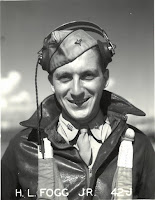Fogg entered Dartmouth in the fall of 1934 as a member of the class
of 1938 and graduated with a degree in English. After his sojourn in New Hampshire, he went back to Illinois to earn a degree from the Chicago Academy of Fine Arts with the intention of becoming a political cartoonist. However, while still in art school, Fogg sold his first train painting for $25. Soon after, he abandoned his aspirations of political cartooning and took a job with the Union Pacific Railroad, all the while painting and selling watercolors of trains in his spare time. He then found employment as an apprentice engineer with Baldwin Locomotive Works, although his stay there was brief: in 1941, Fogg was drafted into the military, became a second lieutenant in the Army Air Force, and flew seventy-six missions as a fighter pilot in World War II.
 During the war, Fogg married Margot Dethier; after moving to Summit, New Jersey, they had three sons while Fogg's true career began as the company artist for the American Locomotive Company (Alco) in 1946. At that point, Fogg began an impressive run of prodigious output, averaging nearly thirty railroad paintings a year for decades afterward. He and his family later moved to Boulder, Colorado, where Fogg would continue to pursue his passion for trains by becoming a very successful and well-respected freelance artist. He died on October 1st, 1996, in his adopted town of Boulder, Colorado. He was one of five honorary members of the Brotherhood of Locomotive Engineers, a designation that underscored the high regard which working railroaders had for his dedication to detail and accuracy in his paintings.
During the war, Fogg married Margot Dethier; after moving to Summit, New Jersey, they had three sons while Fogg's true career began as the company artist for the American Locomotive Company (Alco) in 1946. At that point, Fogg began an impressive run of prodigious output, averaging nearly thirty railroad paintings a year for decades afterward. He and his family later moved to Boulder, Colorado, where Fogg would continue to pursue his passion for trains by becoming a very successful and well-respected freelance artist. He died on October 1st, 1996, in his adopted town of Boulder, Colorado. He was one of five honorary members of the Brotherhood of Locomotive Engineers, a designation that underscored the high regard which working railroaders had for his dedication to detail and accuracy in his paintings.To leaf through Fogg and Steam, come to Rauner and ask for Alumni F688f. To read more about Howard Fogg's time at Dartmouth, ask for his alumni file. We would like to thank Jeff Ashworth '71 for bringing Fogg and his 100th birthday to our attention. For more about the captivating art of Howard Fogg '38, he recommends Ronald C. Hill and Al Chione's The Railroad Artistry of Howard Fogg, published in 1999. To read more about Fogg's experiences as a fighter pilot during World War II, read Richard and Janet Fogg's Fogg in the Cockpit, published in 2011.


Thank you so much for remembering Howard. If you're interested in Howard's fighter pilot career during WWII, our book Fogg in the Cockpit is based on the diary he kept while in the ETO. ~ Janet and Richard Fogg
ReplyDeleteDear Janet and Richard, thank you for your kind words and for reminding us about your book! We will add a reference to it in the main body of the blog post.
ReplyDelete